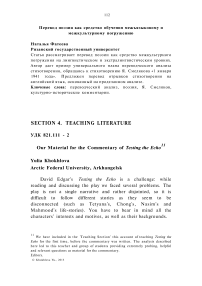Our material for the commentary of Testing the echo
Автор: Khokhlova Yulia
Журнал: Тропа. Современная британская литература в российских вузах @footpath
Рубрика: Teaching literature
Статья в выпуске: 9, 2015 года.
Бесплатный доступ
The article focuses on teaching David Edgar's play Testing the Echo. The author discusses some possible approaches to reading and discussing this play in an EFL class with students who study Pedagogy.
Testing the echo, david edgar, teaching
Короткий адрес: https://sciup.org/147231032
IDR: 147231032 | УДК: 821.111
Текст научной статьи Our material for the commentary of Testing the echo
When we realized that the application process provides two routes to gaining British citizenship (a. studying for and taking Life in the UK Test and b. taking the ESOL course with Citizenship content) we had to reconsider much and begin from the start. Therefore, some introductory information about how to become a British citizen is necessary.
The conflicting opinions of bloggers, historians and public officials seem to break up the narrative even more and make it confusing (maybe this is the true intention of the dramatist - or is it?). However, the students enjoyed the discussion of some stereotypes and cliches introduced in the play. Some scenes are still difficult to interpret, for example Scene Twenty-Six, pp. 4043. Do we deal with any stereotypes here? Then Scene ThirtySeven alludes to John Major and George Orwell (p. 59). Does this allusion mean that nothing (or little) has changed in British politics? Is it even about politics? We were not so sure about the tone in Scene Thirty-Eight pp. 60-62. Is it mocking? What or who is targeted? Is the aim of the scene to emphasize Chong's embarrassment? In Scenes Fifty-Three (p.81) and Sixty-Three (p.97) are Ian and Martin talking hypothetically or do they mean any countries in particular? We were not so sure about these references to "10th of July" (p.45) and "Fook In A-dar" (p.47). Is the latter used for the sake of teasing?
We read this play in a monoethnic class with the common religious background (Russian, Russian Orthodox), so we had to dig deeper in some basic concepts (such as kufr girlfriend p. 9, dhal p. 9, hummus p.33, the fatwa against Salman Rushdie p. 87, jilbab p.95 and even the Qur'an and so on) and it took much time and effort but surely it was worth it. These references to the Muslim culture seem to dominate the text and most characters of the play are of Muslim background. We wonder whether it is done so to underline a shock of cultural differences, or to discuss a change in the idea of Britishness, or even to provoke us into considering dangers of islamisation or islamophobia. Or should we try all possible approaches?
The students of my group are trained to be teachers of foreign languages. They found the scenes with Emma teaching her
ESOL class more interesting and thought provoking. They eagerly compared methods of language teaching that they know of, pointed out the way some grammar rules are explained or introduced in language teaching and discussed Emma struggling with her class at length. I think this discussion was very useful as I know that there are more and more pupils of different ethnic backgrounds in the schools of Arkhangelsk. I talked to a few teachers of primary classes who deal with this increasing ethnic diversity. Our students may face these problems in their future careers, so while discussing the play we considered some conflict resolution strategies (if there were any!) in a multicultural classroom. We did not understand though a few things or maybe we missed something. For example, we could not understand Emma's words: "Even the wonders of ninety-sixty-fucking/-eight-" p. 95. We are not sure about these abbreviations the UCU (p. 93) and the THES (p. 96).
I also believe it would be more fruitful to read and discuss this play in a multiethnic class so that our students could share their own experience of their cultural and religious backgrounds or problems living in specific communities. Now I am considering the possibility of inviting some foreign students who study at our university to take part in these discussions of the play.
Список литературы Our material for the commentary of Testing the echo
- Edgar, David. Testing the Echo. CPI Bookmarque, 2008.107 p


